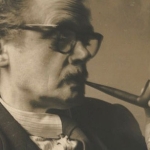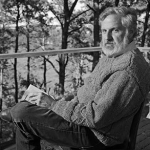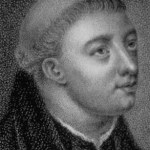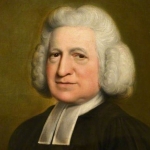The function, as it seems to me,
O’ poetry is to bring to be
At lang, lang last that unity ...
But wae’s me on the weary wheel!
Higgledy-piggledy in’t we reel,
And little it cares hoo we may feel.
Twenty-six thoosand years ’t’ll tak’
For it to threid the Zodiac
—A single roond o’ the wheel to mak’!
Lately it turned—I saw mysel’
In sic a company doomed to mell,
I micht ha’e been in Dante’s Hell.
It shows hoo little the best o’ men
E’en o’ themsels at times can ken—
I sune saw that when I gaed ben.
The lesser wheel within the big
That moves as merry as a grig,
Wi’ mankind in its whirligig,
And hasna turned a’e circle yet
Tho’ as it turns we slide in it,
And needs maun tak’ the place we get.
I felt it turn, and syne I saw
John Knox and Clavers in my raw,
And Mary Queen o’ Scots ana’,
And Rabbie Burns and Weelum Wallace,
And Carlyle lookin’ unco gallus,
And Harry Lauder (to enthrall us).
And as I looked I saw them a’,
A’ the Scots baith big and sma’,
That e’er the braith o’ life did draw.
‘Mercy o’ Gode, I canna thole
Wi’ sic an orra mob to roll.’
—‘Wheesht! It’s for the guid o’ your soul.’
‘But what’s the meanin’, what’s the sense?’
—‘Men shift but by experience.
’Twixt Scots there is nae difference.
They canna learn, sae canna move,
But stick for aye to their auld groove
—The only race in History who’ve
Bidden in the same category
Frae stert to present o’ their story,
And deem their ignorance their glory.
The mair they differ, mair the same.
The wheel can whummle a’ but them,
—They ca’ their obstinacy “Hame,”
And “Puir Auld Scotland” bleat wi’ pride,
And wi’ their minds made up to bide
A thorn in a’ the wide world’s side.
There ha’e been Scots wha ha’e ha’en thochts,
They’re strewn through maist o’ the various lots
—Sic traitors are nae Langer Scots!’
‘But in this huge ineducable
Heterogeneous hotch and rabble,
Why am I condemned to squabble?’
‘A Scottish poet maun assume
The burden o’ his people’s doom,
And dee to brak’ their livin’ tomb.
Mony ha’e tried, but a’ ha’e failed.
Their sacrifice has nocht availed.
Upon the thistle they’re impaled.
You maun choose but gin ye’d see
Anither category ye
Maun tine your nationality.’
And I look at a’ the random
Band the wheel leaves whaur it fand ’em
‘Auch, to Hell,
I’ll tak’ it to avizandum.’ ...
O wae’s me on the weary wheel,
And fain I’d understand them!
And blessin’ on the weary wheel
Whaurever it may land them! ...
But aince Jean kens what I’ve been through
The nicht, I dinna doot it,
She’ll ope her airms in welcome true,
And clack nae mair aboot it ...
*****
The stars like thistle’s roses floo’er
The sterile growth o’ Space ootour,
That clad in bitter blasts spreids oot
Frae me, the sustenance o’ its root.
O fain I’d keep my hert entire,
Fain hain the licht o’ my desire,
But ech! the shinin’ streams ascend,
And leave me empty at the end.
For aince it’s toomed my hert and brain,
The thistle needs maun fa’ again.
—But a’ its growth ’ll never fill
The hole it’s turned my life intill! ...
Yet ha’e I Silence left, the croon o’ a’.
No’ her, wha on the hills langsyne I saw
Liftin’ a foreheid o’ perpetual snaw.
No’ her, wha in the how-dumb-deid o’ nicht
Kyths, like Eternity in Time’s despite.
No’ her, withooten shape, wha’s name is Daith,
No’ Him, unkennable abies to faith
—God whom, gin e’er He saw a man, ’ud be
E’en mair dumfooner’d at the sicht than he
—But Him, whom nocht in man or Deity,
Or Daith or Dreid or Laneliness can touch,
Wha’s deed owre often and has seen owre much.
O I ha’e Silence left
—‘And weel ye micht,’
Sae Jean’ll say, ‘efter sic a nicht!’





















Comment form: